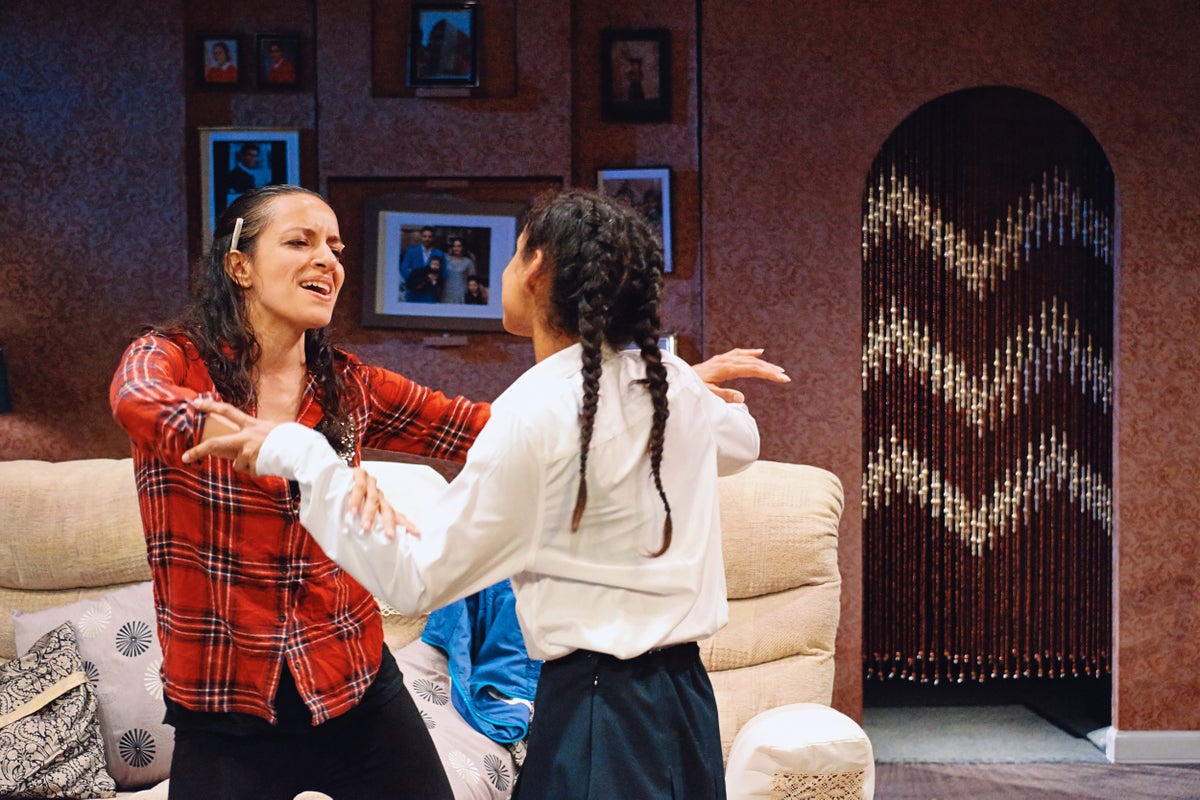
There’s a reason why East is East was such a hit. It showed us something we hardly ever see on stage or screen: a working-class Muslim family. Ayub Khan-Din’s play, produced by Tamasha in 1996 (also a hit film in 1999) was set in the Seventies, but the action still feels so alive and relevant today. It’s a kitchen sink family drama centred around a culture that society hasn’t connected with the kitchen sink genre. In fact, the everyday struggles of ordinary people that define the kitchen sink genre are extremely common in working-class South Asian homes. There have been a number of depictions of conservative South Asian households on our televisions. These haven’t been wrong, necessarily – but it’s a restricted kind of representation. Failing to cast a broader lens on lesser shown pockets within the culture means that we’re missing the chance to see the complicated, roaring, non-subservient South Asian women.
I wanted to bring those women to the stage when I came to write my play, Favour, which is opening at the Bush Theatre this week. It’s a story about a working-class Muslim family living in Ilford who are impacted by the criminal justice system and addiction. It’s centred around three generations of women and how they survive the impact and understand the consequences of both of those things.
I wanted to write a play about single mothers. The portrayal of South Asian families has often been defined by a patriarchal foundation: the fathers, brothers and the many forms of uncles. I came from a long line of single mothers who raised their children on their own. The notion or idea of a father seemed like a bonus rather than a necessity, which is something I wanted to capture in the play. It’s not about women lyricising endlessly about men being absent, but instead working from a matriarchal foundation instead and finding a new way of prevailing. My childhood was one of ferocious women who held their space alone with rage, desire, sadness, intellect, addiction, humour, intensity, and strength. Which is what I hope pours out from the characters in Favour.
I was commissioned to write the play by Clean Break, a theatre company that works with women with lived experience of the criminal justice system or are at risk of entering it. To tell this story, I was introduced to a number of organisations who are integral in helping South Asian women who have been impacted by the criminal justice system - including the Southall Black Sisters, and the Muslim Women in Prison Project run by Sofia Buncy. Although my initial idea came from a much more personal place, the reports and case studies I encountered around South Asian women in prison (such as the 2014 Muslim Women in Prison report) gave me a real sense of urgency to tell this story. Many of the reports I read stated that Muslim women who left the prison system felt a great deal of judgement and shame when returning back to their communities, often describing it as ‘serving a second sentence’, whilst men would return home and be celebrated.

The other big theme in the play is addiction. Whilst carrying out research before writing the play, it became known to me that many members within South Asian communities had a lower participation in alcohol/drug prevention health services compared to other demographics. This didn’t surprise me, based on my own personal connection to someone who suffered with addiction. It was clear to me that shame and judgement were at the core of the reasoning behind this and that was something I wanted to tackle in the play. Our lead character is repeatedly muzzled by her mother in order to clamber back the families ‘izzat’ (honour). This shortens the string on the big block of dynamite which is about to explode. The consequences and ramifications of silencing women are two things I explore.
Favour is being brought to the stage by a group of brilliant women, from the cast to the directors, to the stage managers, to the producers, across to the sound, set and lighting designer. It’s been an emotionally freeing space. I have been working alongside Róisín McBrinn (outgoing Joint Artistic Director of Clean Break) over the past three years on this play, as well working with her as an actress on the late Sonya Hale’s play BLIS-TA (which is available to listen to on Clean Break’s website – with a moving introduction from Clean Break patron Lucy Kirkwood) and carrying out playwriting courses in New Hall Prison alongside her.
Favour was born out of urgency. I felt compelled to tell these women’s stories. And although it’s centred around a South Asian family, my hope is that its impact will be universal. It’s distinctive, provocative, and passionate. We can’t wait to share it with the world.
Favour is at Bush Theatre until 6 August







